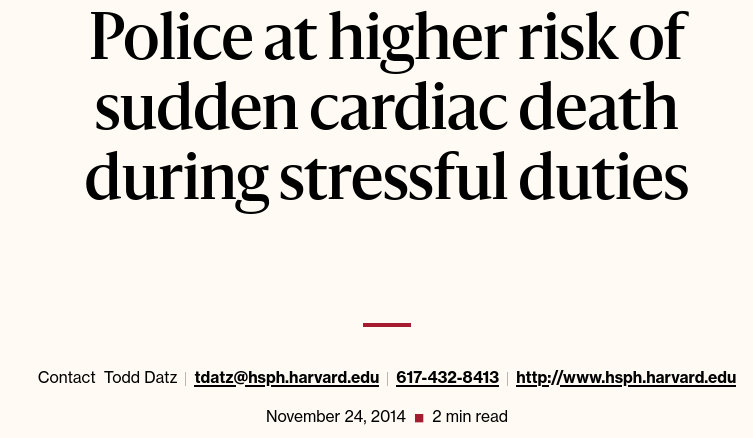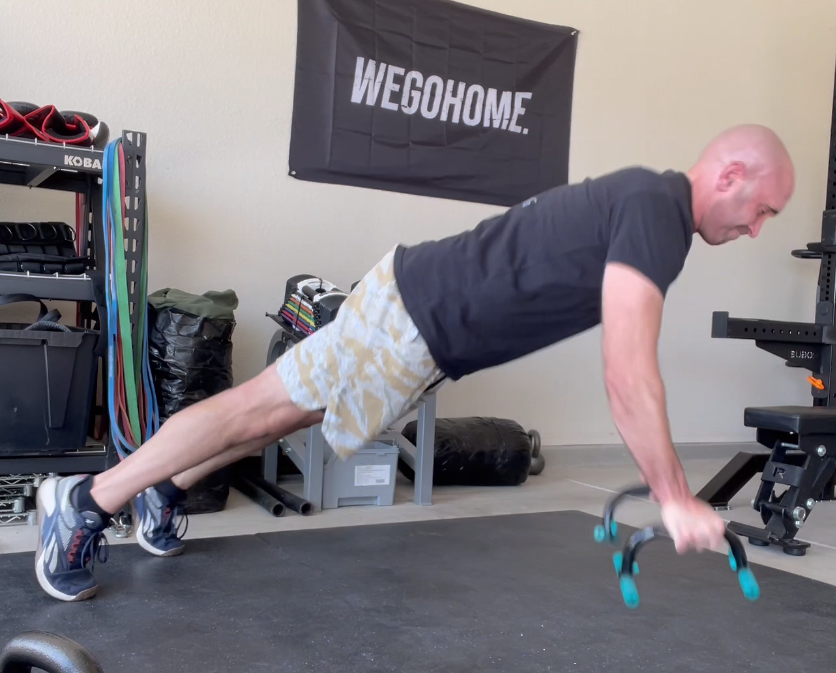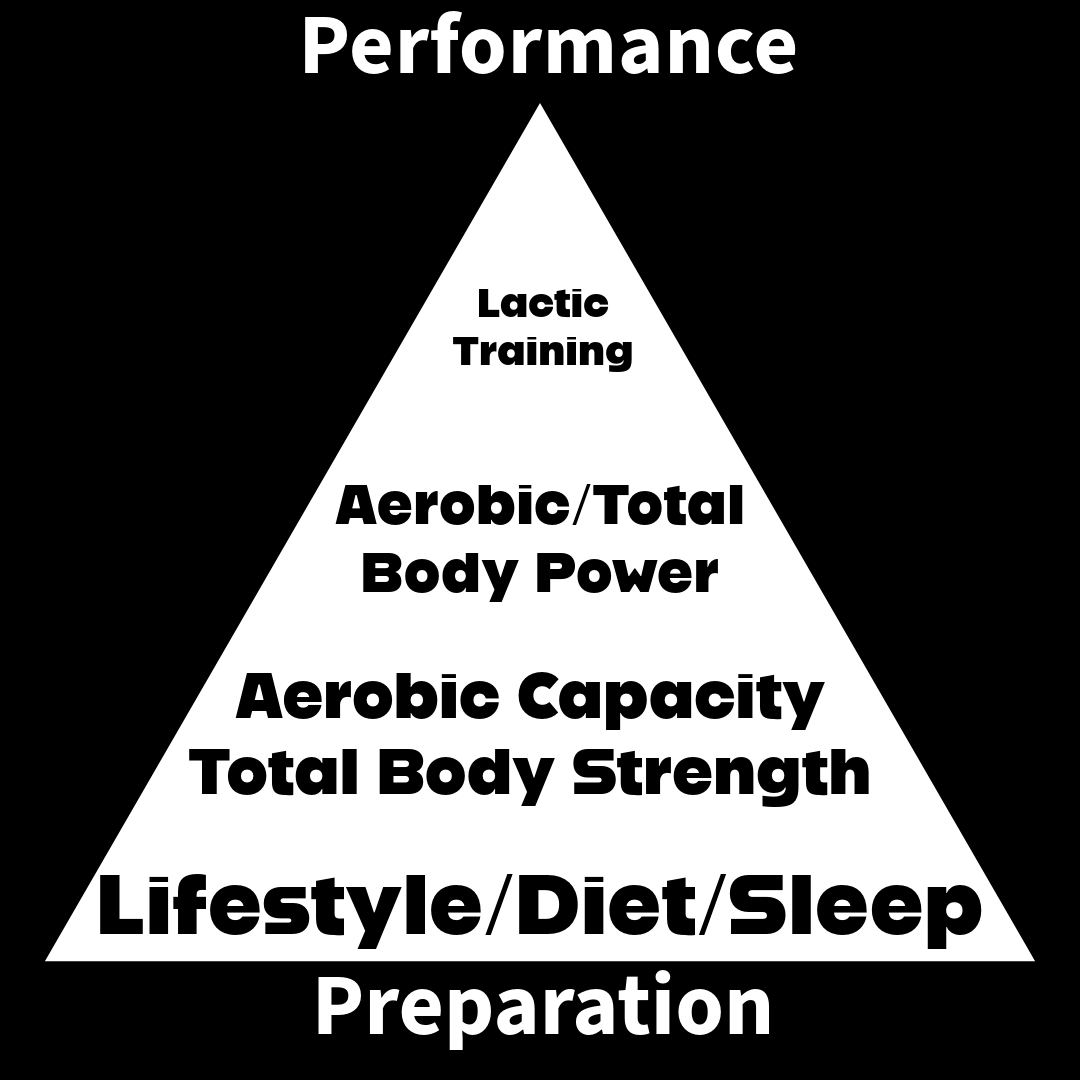When people see the very basic/minimum aerobic standard I recommend for law enforcement the feedback I receive is somewhere between:
-
It is useless to run 1.5 miles
-
The standard isn’t high enough.
-
Pay cops more before you bring up standards
Of course I agree we should pay police more, and you will be hard pressed to find someone who is more supportive of good police, but there is a reason why I recommend this standard. It comes down to:
-
Health
-
Trainable recruits/officers
General Health
Although these studies are a few years old, I am sure not much has changed regarding the general health of officers on the job. The schedules are challenging and officers often struggle to prepare for a healthy(ier) lifestyle to support the insanity of the profession.

The abstract above says it all. Poor sleep, obesity, high cholesterol, and according to this study one of the worst cardiovascular disease profiles of any occupation. I am not a doctor, this is not medical advice, but what is probably going to improve those numbers? Starting with lifestyle- Better dietary habits and sleep and basic aerobic work. Training the heart- which is what you do when you do your cardio needs to be in your strength and conditioning programming and is just as important as anything else you're doing.

Why is conditioning important? Another study from Harvard found Police officers are also at higher risk for sudden cardiac death after stressful situations. What helps individuals handle stress? Quality training and fitness. Train. When you are trained and fit you will be more likely to recover from these stressful encounters. As I have said in other articles, strength and conditioning is symbiotic with hard tactical training. You can’t have one without the other. You need to be able to physically perform while on duty on behalf of your community, teammates, and to return home to your family. If you are not training...both your fitness and your skill-sets...you’re letting these people down.
Trainable Officers
Ironically, even though I recommend that recruits/officers maintain the ability to be able to run 1.5 miles in 14:21...which let us be real here...that time could be run/walked at a very comfortable pace for anyone who is at least halfway in aerobic shape. However, there is a legit critique of this: when does an officer ever run 1.5 miles while on shift? It is rare. So why recommend it?
If you can hit this very doable time and distance, you probably at least have done SOMETHING in the gym or on the track to prepare for your duties. The NYPD used this standard for years, and if for years recruits could pass this I don’t see why we can’t use this as a baseline. Do I want this to be higher? Of course! But if you pass this you have at least some kind of an aerobic base. Now when the recruit enters the academy he or she can handle a bit more intensity/training. In theory, you can now be taken to the next level by somebody who knows how coach/program.
There is certainly a time and a place to add stress to training, see if people quit, etc...but once you’re beyond this some level of structured programming needs to be used. I spoke with someone who was in charge of training new recruits at a large metropolitan police department. They had to restructure their initial training in the academy because so many of the recruits were getting injured in the initial phase and then dropping out. Now the first few weeks are all about just getting the recruits physically ready for the actual academy. This is our reality right now. However, if recruits show up and achieve this minimum at least you should have some wiggle room to train them.

The answer of course isn’t lowering standards. I know we need more cops. Let me rephrase that...we need more good cops. Then we need to keep these good cops and teach them how to maintain their fitness. Where do you start if you’re trying to build your aerobic fitness?
-
At least 3x a week aerobic focused training. (You can still strength train- in fact you should)
-
This may take 4-8 weeks depending on your fitness level before you see improvement. Patience.
-
Each session should focus on keeping your heart rate in the 115-150 beats per minute (bpm) zone.
-
Slow down if you go over 150 bpm
-
These should be primarily cyclic movements for now- rower, bike, running (if you’re ready or need to), sled, rucking, or a combination of it all.
-
Sessions should be around 30-60 Minutes- Start on the lower end first
-
As your fitness improves you can add in some short duration sprint work- but follow it up with full recovery- for now.
-
Measure your resting heart rate in the beginning. At the end of the 8 weeks it should be lower.
-
These sessions are great to work in skill training (range work, BJJ, bag work, etc)
-
Once you build an aerobic base you can now add more intensity to your training, just understand you still need to maintain this fitness quality...at least 1-2x a week.
If you’re still a little lost, or you want to take the guess work out, check out our programming with a free one week trial. No matter the phase, we are always doing some kind of aerobic work in various capacities. Questions, please reach out!



